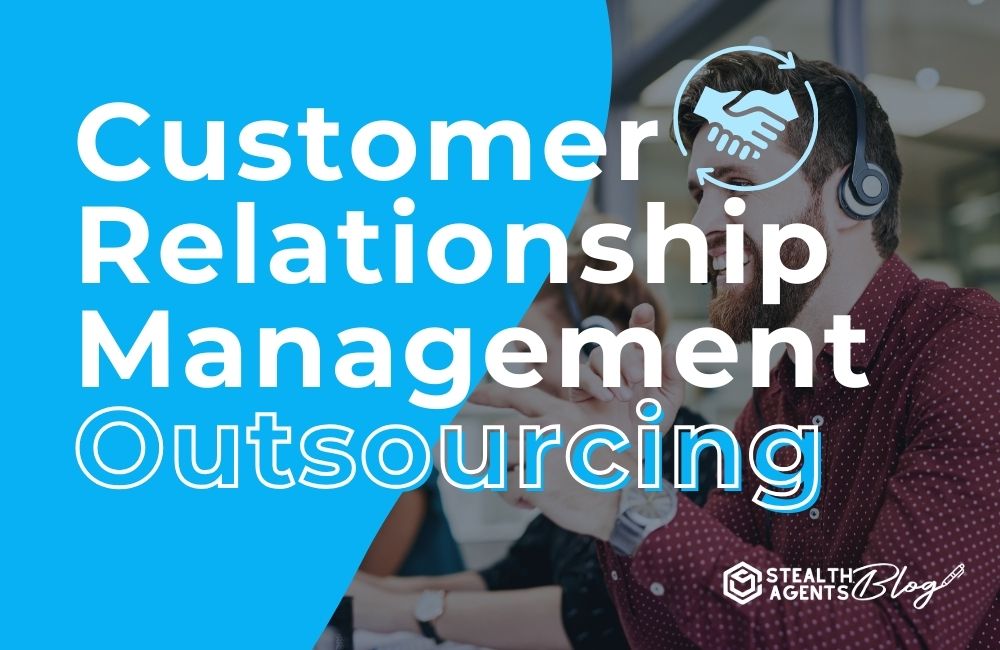Customer relationship management outsourcing is the smart way to boost retention, simplify customer interactions, and grow your business without the hassle. Stealth Agents provides expert CRM support that saves you time, cuts costs, and keeps your customers happy—so you can focus on scaling. Explore how here.
Customer Relationship Management (CRM) outsourcing can be a strategic move for businesses looking to enhance customer interactions while optimizing costs and focusing on core competencies.
With the increasing demand for superior customer experiences, outsourcing CRM functions can provide valuable support to organizations in managing customer relationships and improving overall efficiency.
What is CRM Outsourcing?
CRM outsourcing involves delegating customer relationship management tasks to a third-party service provider.
This includes customer support, feedback collection, data management, and sometimes, marketing communications.
The goal is to enhance customer satisfaction, streamline communication, and foster customer loyalty.
Why is customer relationship management so important?
1. Enhanced Customer Satisfaction:
CRM systems help businesses understand and anticipate their customer’s needs and preferences by consolidating customer information across different channels.
This enables personalized interactions and service, which significantly improves customer satisfaction.
When customers feel their needs are being met, they are likelier to continue doing business with a company and even refer it to others.
2. Increased Customer Retention:
By maintaining detailed customer interactions and history records, businesses can proactively address issues and nurture their relationships with customers.
This leads to increased loyalty and retention, as customers are more likely to stay with a brand that understands their needs and values their business.
This ultimately leads to a higher customer lifetime value and a more substantial customer base.
3. Improved Sales and Marketing Strategies:
CRM systems provide valuable insights into customer behavior and trends.
Businesses can use this data to tailor their marketing strategies and sales pitches to meet their target audience’s specific preferences and needs, which can lead to higher conversion rates.
With CRM, businesses can also track customer interactions and identify potential leads, making targeting the right customers at the right time easier.
4. Efficiency and Automation:
CRM automates and optimizes customer-related processes like follow-ups, billing, and customer service.
This not only reduces employees’ workload but also minimizes the chances of human error, leading to more efficient operations.
Automation can save time and resources, allowing businesses to focus on other essential tasks.
5. Centralized Information:
A CRM system centralizes all customer data, making it easily accessible to anyone in the organization who needs it.
This facilitates better communication within the company and ensures everyone is on the same page regarding customer interactions.
As a result, customer issues can be resolved quickly and efficiently, leading to an overall positive experience.
6. Segmentation and Targeting:
CRM allows businesses to segment their customers into different groups based on criteria like purchasing behavior, demographics, and psychographics.
This segmentation helps deploy targeted marketing strategies that are more likely to resonate with each specific group.
Businesses can improve their conversion rates and increase sales by targeting the right customers with the right message.
7. Scalability:
As businesses grow, managing customer relationships manually becomes increasingly tricky.
A CRM system can scale with the business, managing a growing amount of data and interactions without reducing performance.
This allows businesses to focus on growth and expansion while providing excellent customer service.
8. Data-Driven Decision Making:
With comprehensive data on customer interactions, businesses can make informed decisions based on data rather than intuition.
This leads to better business strategies and outcomes.
CRM systems can also provide insights into customer behavior, trends, and preferences, allowing businesses to anticipate market demands and stay ahead of the competition.
What is our budget for CRM outsourcing?
Determine how much you are willing to invest in outsourcing CRM.
This will help you choose a service provider with the best budget value.
Remember that the cheapest isn’t always the best option, as the quality of service and expertise may be compromised.
Having a clear budget also allows you to negotiate with potential providers and make informed decisions about what features and services you can afford. It’s essential to to weigh the cost against outsourcing CRM’s possible benefits and ROI (return on investment).
Where to outsource best for CRM service?
Stealth Agents is an excellent choice for outsourcing CRM services, and they are known for their expert handling of customer relationships.
They offer tailored CRM solutions, advanced data management, and practical customer support.
With their cutting-edge technologies and proven track record in enhancing customer satisfaction, Stealth Agents ensures your CRM is managed efficiently and effectively, making them a reliable partner for optimizing customer engagement strategies.
How will outsourcing impact our customer relations?
Consider the potential effects on customer satisfaction and loyalty. Ensure the provider can deliver a seamless customer experience.
Outsourcing can significantly impact our customer relations, both positively and negatively. It is essential to consider the potential effects carefully and plan accordingly to maintain strong customer relationships.
On the positive side, outsourcing can improve customer satisfaction by allowing us to provide faster and more efficient services. By outsourcing specific tasks or processes, we can free up more time and resources to focus on our core competencies and provide better overall customer experience.









